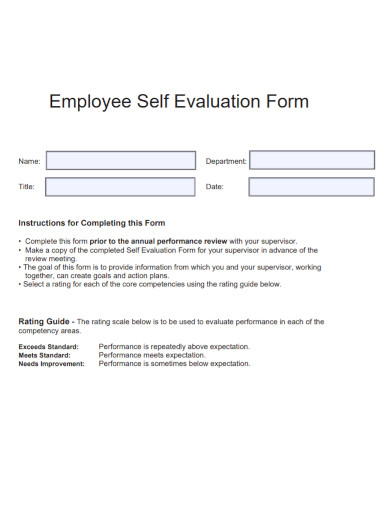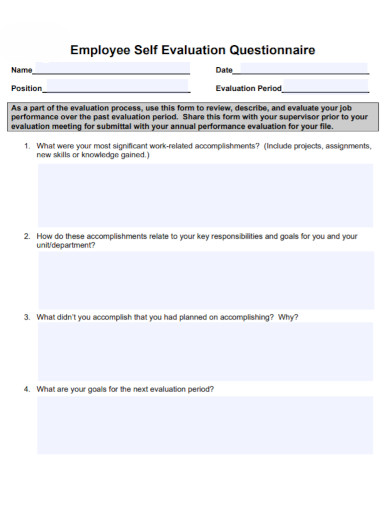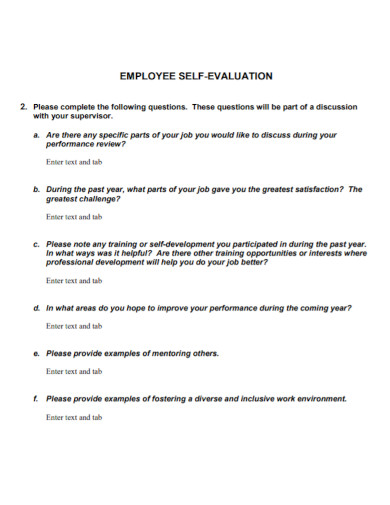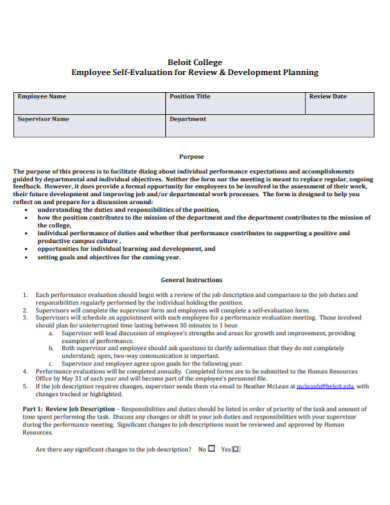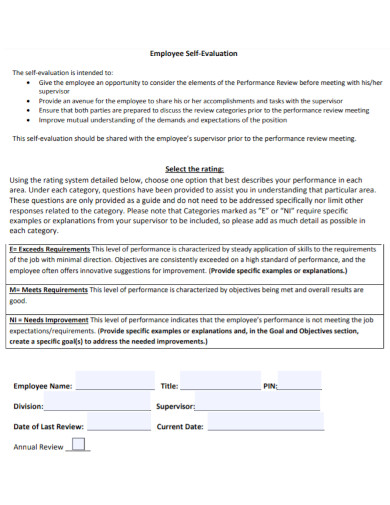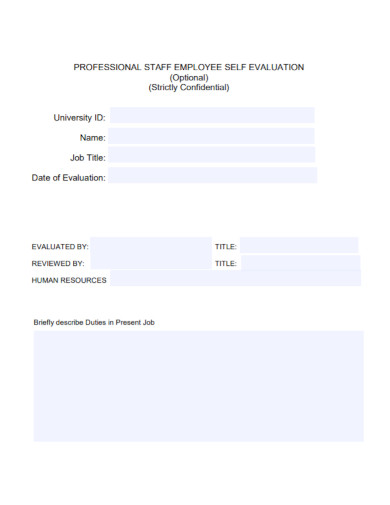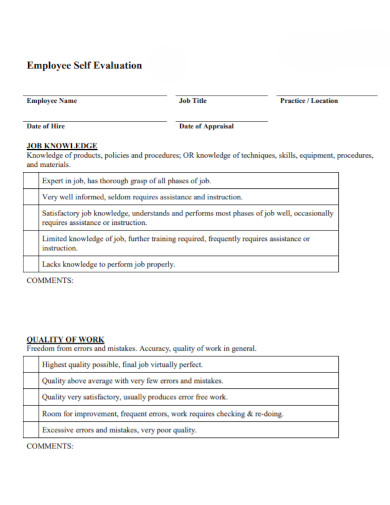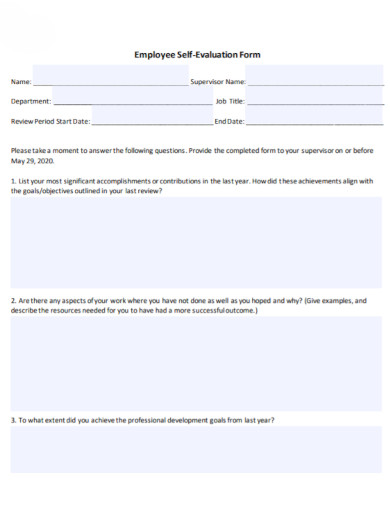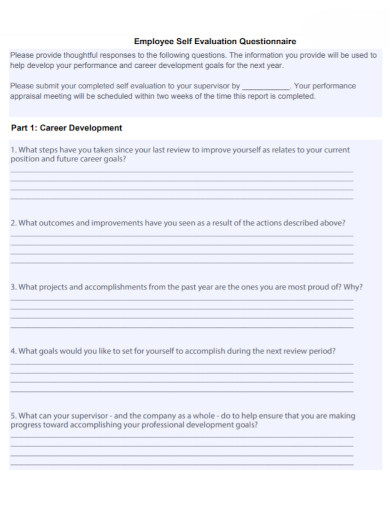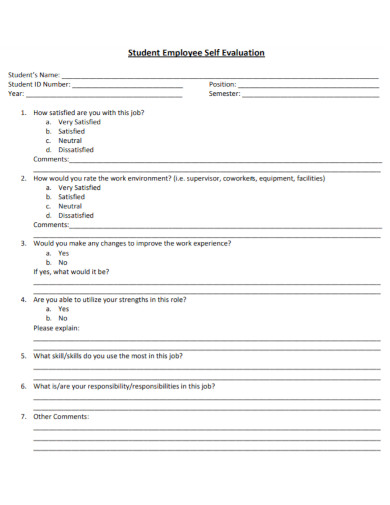10+ Employee Self Evaluation Examples to Download
Evaluating yourself for the benefit of seeing how you are is necessary for your well-being. Also evaluating yourself to see how far you have come and to see any improvements for yourself. Self-evaluations are required of you whether you are a college student, a college employer, or a corporate employee. This is to determine whether or not you are still qualified for your current employment. In addition to learning where you excel and where you may need some work, you get insight into your overall performance.
10+ Employee Self Evaluation Examples
1. Staff Employee Self-Evaluation Template
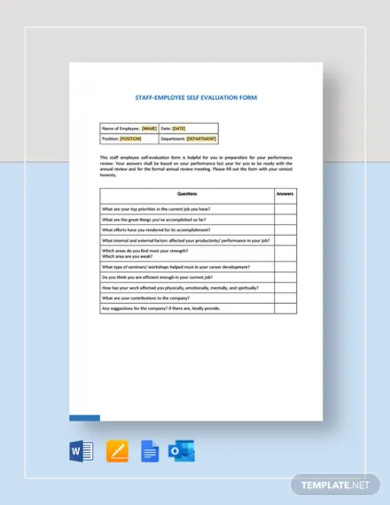
2. Employee Self Evaluation Form
3. Employee Self Evaluation Questionnaire
4. Basic Employee Self Evaluation
5. Employee Self Evaluation Planning
6. College Employee Self Evaluation
7. Professional Employee Self Evaluation
8. Standard Employee Self Evaluation
9. Printable Employee Self Evaluation
10. Career Development Employee Self Evaluation
11. Student Employee Self Evaluation
What is Employee Self Evaluation?
Employee self-evaluation is a process where an employee assesses their own performance and accomplishments over a specific period. This can be a valuable tool for both the employee and the employer as it allows for an open and honest conversation about job performance.
During a self-evaluation, the employee can reflect on their strengths, weaknesses, achievements, and areas for improvement. This process can help the employee identify their own professional goals and create a plan to achieve them. It also provides an opportunity for the employee to discuss their career aspirations with their manager and seek feedback on their performance.
How to do an Employee Self Evaluation
The process of employee self-evaluation should be conducted in a constructive and non-judgmental manner. Employees should be encouraged to provide honest feedback and highlight their achievements and accomplishments. Managers should provide guidance and support to employees as they work to identify areas for improvement and create a plan for development.
Step 1: Review job responsibilities
Employees should review their job responsibilities and performance goals to ensure they understand the expectations for their role.
Step 2: Gather feedback
Employees should gather feedback from colleagues, managers, and clients to gain a well-rounded view of their performance. This feedback can be used to identify areas for improvement and successes.
Step 3: Evaluate performance
Using the job responsibilities and feedback gathered, employees should evaluate their own performance over the review period. They should reflect on their accomplishments, areas for improvement, and how they have met or exceeded expectations.
Step 4: Set goals
Based on their self-evaluation, employees should set goals for their future performance. These goals should be specific, measurable, achievable, relevant, and time-bound (SMART).
Step 5: Create a development plan
Employees should create a development plan to achieve their goals. This plan should include the resources needed, steps to take, and a timeline for completion.
Step 6: Schedule a meeting
Once the self-evaluation is complete, employees should schedule a meeting with their manager to discuss their self-evaluation and development plan. The meeting should be focused on constructive feedback and goal setting for the future.
Step 7: Be open to feedback
During the meeting with their manager, employees should be open to feedback and willing to discuss areas for improvement. This is an opportunity for employees to learn from their mistakes and grow professionally.
Step 8: Follow up
After the meeting, employees should follow up on their development plan and work towards achieving their goals. Regular check-ins with their manager can help ensure progress is being made and adjustments can be made if necessary.
FAQs
When writing the essay, do I need to list down my accomplishments and strengths?
If you are asked to write down your accomplishments and strengths, you should. Also as much as possible, your accomplishments should line with the company’s objectives and mission statement.
Why is employee self-evaluation important?
Employee self-evaluation is important because it allows employees to take ownership of their performance and set goals for professional growth. It also provides a platform for open communication between employees and managers, which can lead to more meaningful feedback and development opportunities.
How should managers use employee self-evaluation results?
Managers should use employee self-evaluation results to gain insights into an employee’s performance, goals, and development needs. This information can be used to provide constructive feedback, offer development opportunities, and create performance improvement plans. It can also be used to inform decisions about promotions, bonuses, and other recognition programs pertaining to their job description.
In conclusion, employee self-evaluation can be a valuable tool for both employees and employers. It provides a platform for open communication, goal setting, and development planning. By encouraging employees to take an active role in their own professional career development goals, employers can create a more engaged and motivated workforce, which can ultimately lead to increased productivity and positive feedback on the job satisfaction survey.



